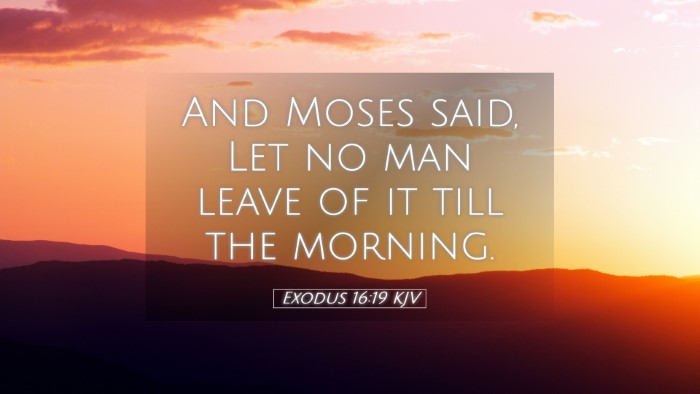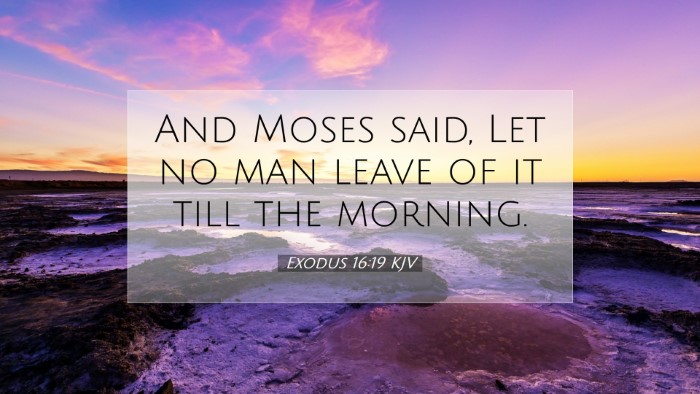Commentary on Exodus 16:19
Verse Context: Exodus 16:19 states, "And Moses said, Let no man leave of it till the morning." This verse comes as part of the narrative concerning God's provision of manna for the Israelites in the wilderness. This event is emblematic of God's faithfulness, the importance of obedience, and the nature of faith over self-reliance.
Overall Significance
This command from Moses underscores an essential principle of dependence upon God. The Israelites had been given a miraculous food source, yet they were instructed not to hoard it for the next day. This highlights the theme of daily dependence on God, a lesson that resonates throughout scripture.
Insights from Commentaries
Matthew Henry’s Commentary
Matthew Henry emphasizes the necessity of trusting God daily. In his viewpoint, the Israelites, having just witnessed God's miraculous provision, were still susceptible to doubt and fear. By instructing them not to leave any manna until the morning, Moses reinforced the notion that God's grace is renewed every day. Henry notes that this reliance on daily provision serves as a reminder of God's continual faithfulness and encourages believers to cultivate a spirit of contentment.
Albert Barnes’ Notes
Albert Barnes provides a theological perspective on the implications of hoarding versus trusting in God's provision. He argues that God desires to cultivate a relationship of trust and obedience with His people. The instruction not to keep manna until the morning illustrates God's character as a provider and His desire for the Israelites to understand that He meets their needs daily. Barnes also points out the spiritual message encapsulated in this prohibition — it teaches believers to live in a manner that reflects reliance on God's ongoing grace and provision.
Adam Clarke’s Commentary
Adam Clarke offers a historical and practical interpretation of this verse. He illustrates that the command served a dual purpose: to prevent the Israelites from becoming self-reliant and to teach them about the nature of God's sustenance. Clarke elaborates that the act of gathering the manna each morning reflects a profound dependence on God's timing and provision. He also highlights that the failure to obey this directive would lead to disappointment and spoiled bread, serving as a metaphor for spiritual disobedience and its consequences.
Thematic Elements
- Dependence on God: The insistence on daily gathering emphasizes a lifestyle of reliance on God's provision. It is a call to acknowledge God's sovereignty and trust in His timing.
- Obedience: The instruction serves as a test of obedience for the Israelites, challenging them to surrender their instinctual desire to hoard for the future.
- Faith Over Fear: This passage encapsulates the ongoing struggle between faith and fear during times of uncertainty. It reassures that faith must supersede human instinct and worry.
Application for Today’s Believers
The lessons drawn from Exodus 16:19 are timeless and relevant. In contemporary society, believers often face similar challenges of anxiety about the future and self-reliant attitudes. The call to trust in God for daily needs remains significant. Pastors, students, and theologians can reflect on the notion that God is not only a one-time provider but desires a continuous relationship characterized by dependence and faith.
Conclusion
Exodus 16:19 serves as a profound reminder of God's daily provision and the necessity of obedience in the life of faith. As seen through the extensive insights of Matthew Henry, Albert Barnes, and Adam Clarke, the passage encourages a lifelong journey of trusting in God's sustenance and living out a faith that is both proactive and dependent.


